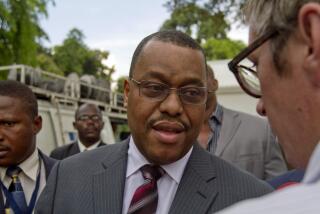Has the U.N. Moved Too Fast?
- Share via
For the sake of Haiti’s long-suffering people, it is to be hoped that the United Nations’ decision to lift sanctions against that nation was prudent, and truly helps to end a two-year-old political crisis. Alas, it is possible that the two powerful groups--Haiti’s thuggish military and wealthy social elite--that combined to oust the popularly elected government of President Jean-Bertrand Aristide have still not accepted defeat.
Aristide, an outspoken Roman Catholic priest, earned the enmity of Haiti’s powerful with his advocacy on behalf of the nation’s poor majority. A military coup ousted him in 1991, and he has remained in exile since. That led to a world outcry--and the worldwide demand for his return to power. Then the Organization of American States imposed some sanctions against the acting military government.
But there was no real progress in the standoff until the United Nations acted. Earlier this year the world body imposed tough sanctions against Haiti, cutting off most oil shipments and freezing the foreign assets of wealthy coup supporters. That brought the plotters to the negotiating table, where the United Nations brokered a deal under which Aristide would return to Haiti Oct. 30. In the meantime he will be represented by a new prime minister, Robert Malval, who is to lay the groundwork for a new government. The U.N. Security Council Friday voted to lift sanctions after Haiti’s National Assembly confirmed Malval.
That’s defensible. But neither Malval nor Aristide are out of the woods yet. For one thing, neither man commands a majority in the National Assembly, which voted to confirm Malval only under intense pressure from the United Nations. For another, the military has packed the government bureaucracy with opponents of Aristide, and they remain in power. So do many of the officers who helped plot the 1991 coup. So while the vast majority of Haitians eagerly welcome the president’s return, the elite and its thugs clearly don’t.
So the United Nations, and the United States, must follow through on Friday’s vote by sending in more U.N. monitors to join the approximately 200 already in Haiti. There is talk of 1,000 U.N. observers and technicians, but more may be needed. Aristide is this close to home only because the entire world, symbolically speaking, is behind him. The United Nations must keep the pressure on.
More to Read
Sign up for Essential California
The most important California stories and recommendations in your inbox every morning.
You may occasionally receive promotional content from the Los Angeles Times.













